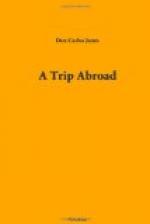For a long time the Arabs have considered Damascus as “an earthly reflection of Paradise,” but an American or European would consider a place no better than it is as being far from the Paradise of Divine making. But it is not entirely without reason that these people have such a lofty conception of the old city. The Koran describes Paradise as a place of trees and streams of water, and Damascus is briefly described in those words. There are many public drinking fountains in the city, and owing to the abundance of water, there are many trees. The river Abana, one of the “rivers of Damascus” (2 Kings 5:12), flows through the city, but the most of its water is diverted by artificial channels. I had some difficulty in finding the American Consular Agent, and it is no wonder, for the place is not the most prominent in Damascus by a good deal, and the escutcheon marking it as the place where the American Government is represented is not on the street, but over a door in a kind of porch. The Agent was not in, so I retraced my steps to the French consulate, which is near by. I was kindly received by a gentleman who could speak English, and after we had had a good, cool drink of lemonade, he went with me to the “Hotel d’Astre d’Orient,” in the “street which is called Straight.” The next morning I found the American Agent in his office. Then I went to the postoffice, and after being taken upstairs and brought back downstairs, I was led up to a little case on the wall, which was unlocked in order that I might look through the bunch of letters it contained addressed in English, and I was made glad by receiving an epistle from the little woman who has since taken my name upon her for life. After reading my letter, I went out and walked up the mountain side far enough to get a bird’s-eye view of the city, and it was a fine sight the rich growth of green trees presented in contrast with the brown earth all around. Returning to the city, I walked about the streets, devoting some of my time to the bazaars, or little stores, in which a great variety of goods are offered for sale. I also saw several kinds of work, such as weaving, wood-turning and blacksmithing, being carried on. The lathes used for turning wood are very simple, and are operated by a bow held in the workman’s right hand, while the chisel is held in his left hand and steadied by the toes on one or the other of his feet. It is a rather slow process, but they can turn out good work. One gentleman, who was running a lathe of this kind, motioned for me to come up and sit by his side on a low stool. I accepted his invitation, and he at once offered me a cigarette, which I could not accept. A little later he called for a small cup of coffee, which I also declined, but he took no offense. “The street which is called Straight” is not as straight as might be supposed from its name, but there is probably enough difference between its course and that of others to justify the name.




